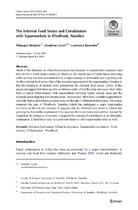The informal food sector and cohabitation with supermarkets in Windhoek, Namibia
Abstract
Much of the literature on urban food systems has focused on supermarket expansion and their ability to reach urban consumers. However, the current pace of urbanisation and rising urban poverty has been accompanied by a major upsurge in informality and a growing role for the informal food sector. One of the persistent arguments in the supermarkets literature is that the expansion of modern retail undermines the informal food sector. Critics of this argument suggest that there are two conditions under which this may not occur: first, when there is spatial differentiation with supermarkets servicing higher income areas and the informal sector targeting low-income areas. And second, when there is market segmentation when the formal and informal sectors focus on the sale of different product types. This paper examines the case of Windhoek, Namibia, which has undergone a major supermarket revolution in the last two decades.

